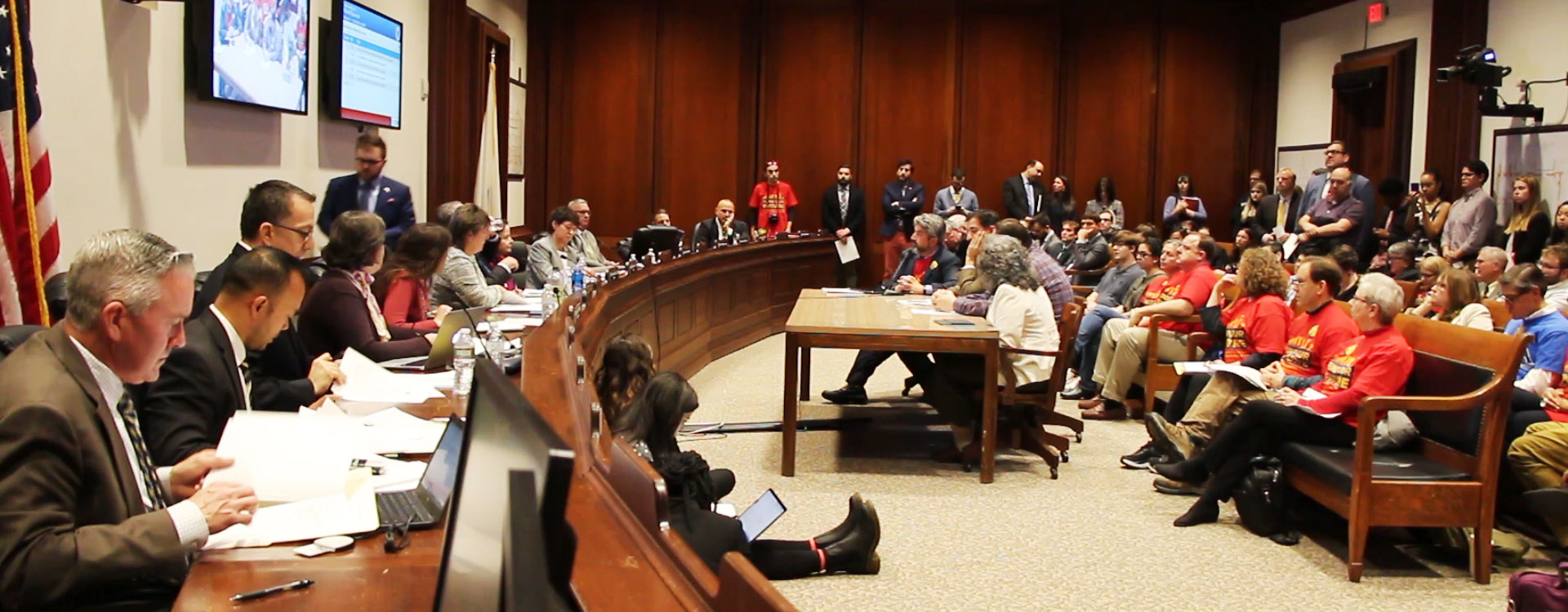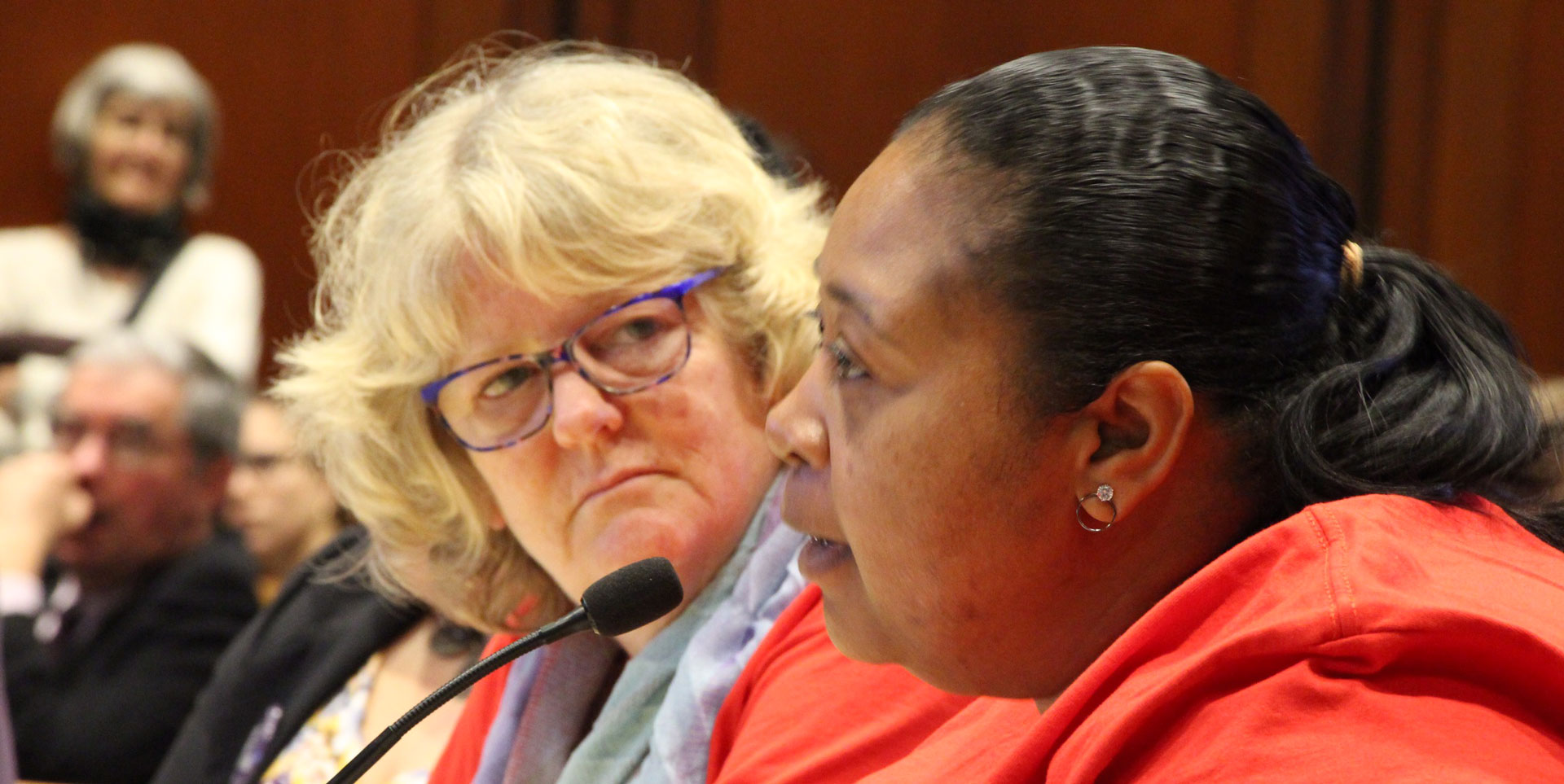Funding of public higher education system is broken, legislators are told
Funding of public higher education system is broken, legislators are told

Although public colleges and universities in Massachusetts are highly regarded, there is broad agreement among students, campus staff, faculty members, administrators and many legislators that the system for funding the state’s higher education system is broken.
Student debt is mounting in public higher education, academic programs are in jeopardy, and support services are severely strained.
Those were the core messages delivered during the course of more than two hours of testimony today before the Legislature’s Joint Committee on Higher Education. Speakers voiced their support for both the Cherish Act and An Act to Guarantee Debt-Free Public Higher Education, also known as the Debt-Free Future Act. Lead sponsors of the Cherish Act are Senator Jo Comerford (D-Northampton), Representative Sean Garballey (D-Arlington) and Representative Paul Mark (D-Peru). Lead sponsors of the Debt-Free Future Act are Senator Jamie Eldridge (D-Acton) and Representative Natalie Higgins (D-Leominster).
“ My story is about how fundamentally broken a system is — that the only way a poor kid can go to college is with a tragic backstory, privileged social identifiers, and a roll of the dice. That is unacceptable.” UMass Amherst student Anthony Mulligan
The Cherish Act is one of two bills at the heart of the Fund Our Future campaign, which involves parents, students and other community members, along with unions and social justice organizations. When fully phased in, the measure would add more than $500 million annually for public higher education, which has experienced a sharp decline since 2001. The other bill is the Promise Act, which seeks more than $1 billion in additional state funding for preK-12 public schools. The Fund Our Future coalition is calling on the Legislature to pass both bills in time for them to take effect before the fall.
The Debt-Free Future Act, for its part, would create a grant program that would cover the full cost of a public college or university for eligible students. No one testified against either the Cherish Act or the Debt-Free Future Act during the hearing, and support for each of the bills was voiced by a wide spectrum of people involved in public higher education.
“We have 29 campuses and 25 boards of trustees, two dozen unions, and a shrinking pie of resources …,” said MTA Vice President Max Page. “And yet you see today a unified public higher education community. Students, staff, faculty, union leaders, presidents and chancellors from all three sectors are here today to call on you to support and — more importantly — fight for passage of the Cherish Act.”
Several MTA members shared their stories with the committee.
Janelle Quarles, president of the Classified Staff Union at UMass Boston, explained how students and staff alike are overburdened by fees, which are undermining the school’s urban mission to provide an accessible high-quality research university for students in Greater Boston. “This is becoming Urban Mission Impossible,” she said.
Joanna Gonsalves, a member of the Massachusetts State College Association and a professor at Salem State University, explained that in order to stop the rise of fees, her campus is making cuts.

“We are hitting a wall,” she said. “We cut 20 percent of our adjunct staff and we are cutting course sections.”
Stephanie Marcotte, an adjunct professor and president of the Holyoke Community College chapter of the Massachusetts Community College Council, said that the lack of funding on her campus has led to reduced hours at the library and fewer course offerings on weekends and nights.
“Many of my students work multiple jobs and are adjusting to a new life in this country. Help me help my students,” she said. “They are suffering with these cuts, and they deserve better.” Massachusetts is ranked 45th in state spending on public higher education nationwide. The Commonwealth also has the fastest-growing public college costs in the country and the second-fastest growth in student debt.
These factors are conspiring to rob students of opportunity. MTA President Merrie Najimy told the committee of being able to attend public college and graduate debt free, paving the way for a career as a public school educator.
Today, she said, students graduate burdened by debt, and campuses are relying too heavily on adjunct faculty, who typically are poorly paid and need to work on many campuses to make ends meet.
UMass Amherst student Anthony Mulligan described the incredible odds he overcame to be able to attend college. But he cautioned that his story is not one that the state should be proud of.
“My story is about how fundamentally broken a system is — that the only way a poor kid can go to college is with a tragic backstory, privileged social identifiers, and a roll of the dice,” he said. “That is unacceptable.”